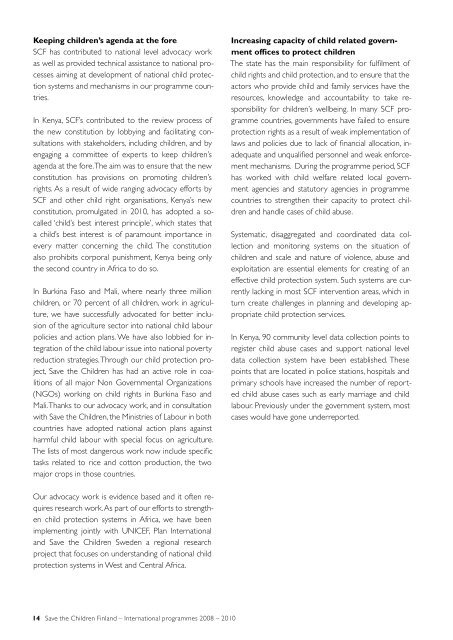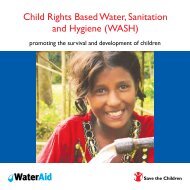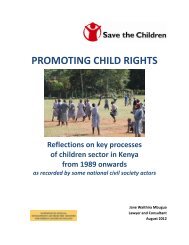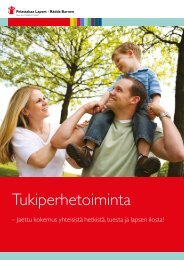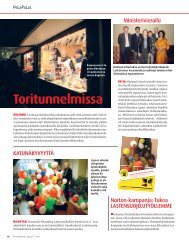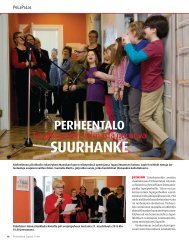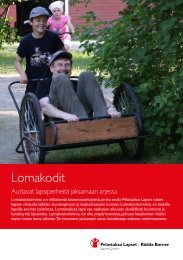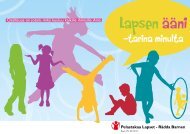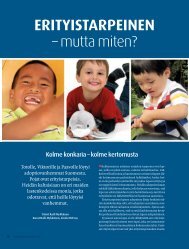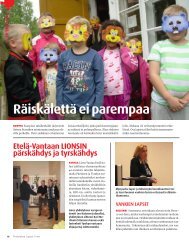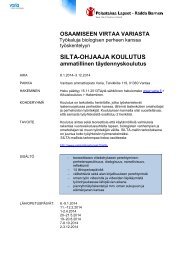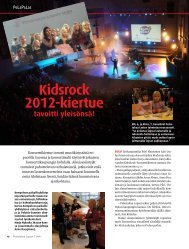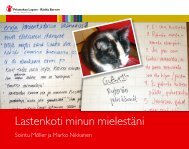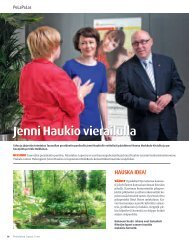Save the Children Finland International Programmes 2008 â 2010
Save the Children Finland International Programmes 2008 â 2010
Save the Children Finland International Programmes 2008 â 2010
Create successful ePaper yourself
Turn your PDF publications into a flip-book with our unique Google optimized e-Paper software.
Keeping children’s agenda at <strong>the</strong> fore<br />
SCF has contributed to national level advocacy work<br />
as well as provided technical assistance to national processes<br />
aiming at development of national child protection<br />
systems and mechanisms in our programme countries.<br />
In Kenya, SCF’s contributed to <strong>the</strong> review process of<br />
<strong>the</strong> new constitution by lobbying and facilitating consultations<br />
with stakeholders, including children, and by<br />
engaging a committee of experts to keep children’s<br />
agenda at <strong>the</strong> fore. The aim was to ensure that <strong>the</strong> new<br />
constitution has provisions on promoting children’s<br />
rights. As a result of wide ranging advocacy efforts by<br />
SCF and o<strong>the</strong>r child right organisations, Kenya’s new<br />
constitution, promulgated in <strong>2010</strong>, has adopted a socalled<br />
‘child’s best interest principle’, which states that<br />
a child’s best interest is of paramount importance in<br />
every matter concerning <strong>the</strong> child. The constitution<br />
also prohibits corporal punishment, Kenya being only<br />
<strong>the</strong> second country in Africa to do so.<br />
In Burkina Faso and Mali, where nearly three million<br />
children, or 70 percent of all children, work in agriculture,<br />
we have successfully advocated for better inclusion<br />
of <strong>the</strong> agriculture sector into national child labour<br />
policies and action plans. We have also lobbied for integration<br />
of <strong>the</strong> child labour issue into national poverty<br />
reduction strategies. Through our child protection project,<br />
<strong>Save</strong> <strong>the</strong> <strong>Children</strong> has had an active role in coalitions<br />
of all major Non Governmental Organizations<br />
(NGOs) working on child rights in Burkina Faso and<br />
Mali. Thanks to our advocacy work, and in consultation<br />
with <strong>Save</strong> <strong>the</strong> <strong>Children</strong>, <strong>the</strong> Ministries of Labour in both<br />
countries have adopted national action plans against<br />
harmful child labour with special focus on agriculture.<br />
The lists of most dangerous work now include specific<br />
tasks related to rice and cotton production, <strong>the</strong> two<br />
major crops in those countries.<br />
Increasing capacity of child related government<br />
offices to protect children<br />
The state has <strong>the</strong> main responsibility for fulfilment of<br />
child rights and child protection, and to ensure that <strong>the</strong><br />
actors who provide child and family services have <strong>the</strong><br />
resources, knowledge and accountability to take responsibility<br />
for children’s wellbeing. In many SCF programme<br />
countries, governments have failed to ensure<br />
protection rights as a result of weak implementation of<br />
laws and policies due to lack of financial allocation, inadequate<br />
and unqualified personnel and weak enforcement<br />
mechanisms. During <strong>the</strong> programme period, SCF<br />
has worked with child welfare related local government<br />
agencies and statutory agencies in programme<br />
countries to streng<strong>the</strong>n <strong>the</strong>ir capacity to protect children<br />
and handle cases of child abuse.<br />
Systematic, disaggregated and coordinated data collection<br />
and monitoring systems on <strong>the</strong> situation of<br />
children and scale and nature of violence, abuse and<br />
exploitation are essential elements for creating of an<br />
effective child protection system. Such systems are currently<br />
lacking in most SCF intervention areas, which in<br />
turn create challenges in planning and developing appropriate<br />
child protection services.<br />
In Kenya, 90 community level data collection points to<br />
register child abuse cases and support national level<br />
data collection system have been established. These<br />
points that are located in police stations, hospitals and<br />
primary schools have increased <strong>the</strong> number of reported<br />
child abuse cases such as early marriage and child<br />
labour. Previously under <strong>the</strong> government system, most<br />
cases would have gone underreported.<br />
Our advocacy work is evidence based and it often requires<br />
research work. As part of our efforts to streng<strong>the</strong>n<br />
child protection systems in Africa, we have been<br />
implementing jointly with UNICEF, Plan <strong>International</strong><br />
and <strong>Save</strong> <strong>the</strong> <strong>Children</strong> Sweden a regional research<br />
project that focuses on understanding of national child<br />
protection systems in West and Central Africa.<br />
14 <strong>Save</strong> <strong>the</strong> <strong>Children</strong> <strong>Finland</strong> – <strong>International</strong> programmes <strong>2008</strong> – <strong>2010</strong>


